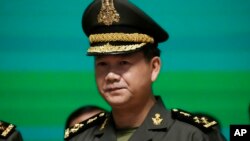Cambodia's king on Monday approved the nomination of the Western-educated son of Prime Minister Hun Sen to become the next premier, confirming a much-anticipated transfer of power by one of the world's longest-serving leaders.
The decree endorsing 45-year-old army general Hun Manet requires the approval of the National Assembly, which will be dominated by the ruling Cambodian People's Party (CPP) after its landslide win in a July 23 election in which all viable opposition was sidelined.
The decree was first posted on the Telegram channel of premier Hun Sen, a former Khmer Rouge guerrilla who has ruled for nearly four decades at the helm of a fast-changing country rebounding from decades of war and poverty.
Hun Manet said on Facebook he was "committed to fulfilling the national mission with heroism, honesty, and responsibility."
"Also, to advance the nation's development and the quality of life for its citizens, and to raise the country's prestige internationally," he said.
Analysts had long expected Hun Sen, a self-styled strongman who turned 71 on Saturday, to take on a key CPP role to protect his son from internal competition and allow him to earn legitimacy among the public and networks of power.
Hun Sen detailed his long record of service on Monday and made clear he would be sticking around longer.
"I will continue serving in other positions at least until 2033," he said.
"Thank you, my dear wife, for raising this unfortunate child during the hardest times so he can become the nation's top leader today."
The legislature is expected to meet on Aug. 22 to vote to approve Hun Manet, who has given no clues on his vision for Cambodia and its 16 million people.
In stark contrast to his father, who has no formal education, Hun Manet studied in the United States and Britain, where he received a master's degree and doctorate respectively, both in economics.
He is also a graduate of the prestigious West Point military academy in the United States and has served as Cambodia's deputy armed forces commander-in-chief, as well as army chief and deputy head of his father's bodyguard unit.
The transition will be closely watched for whether Hun Manet maintains his father's authoritarian status quo, or pursues a more liberal democracy with closer ties to the West after years under the influence of biggest investor China.
The election, in which Hun Manet won a house seat, was derided as a sham by human rights groups and criticized by the United States as being neither free nor fair, after an opposition party was barred from running.
The leader of a U.S. business lobby for Southeast Asia told Reuters it planned to host Hun Manet in New York after he becomes prime minister, saying he was "a different person."
Hun Sen has locked horns with Western countries and the United Nations for decades and has ignored calls for an end to his fierce, years-long crackdown that decimated his political opposition and led to calls for his suspension from Facebook for threatening rivals.
He has said he would lead the CPP, become president of the upper house Senate, and would step back in to the prime minister's job if his son did not perform well.







